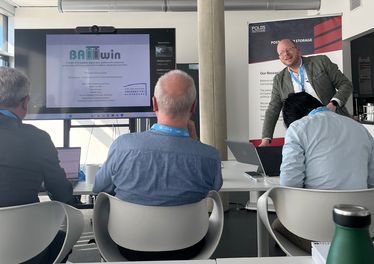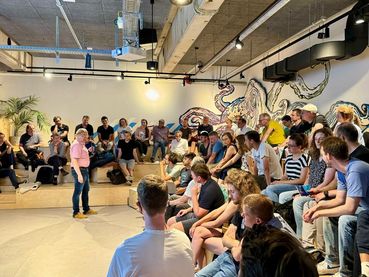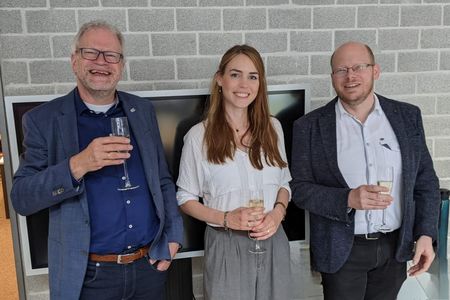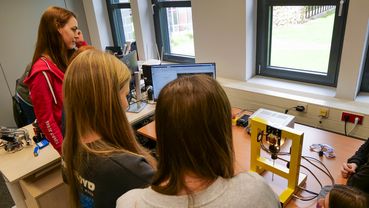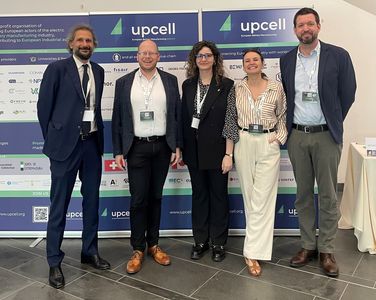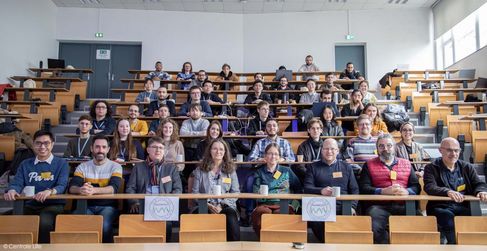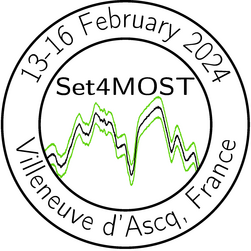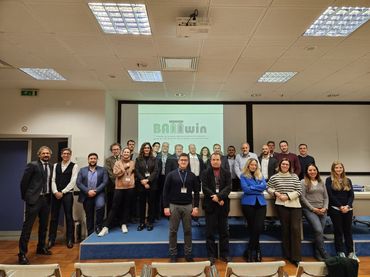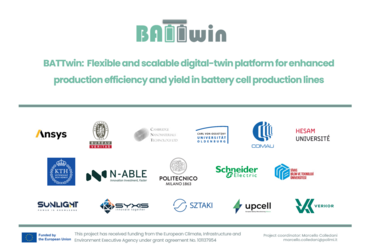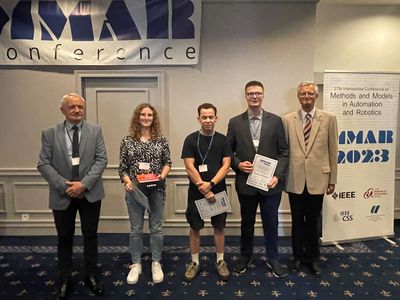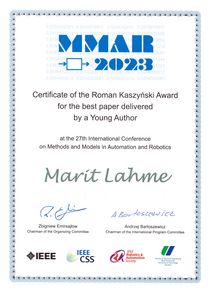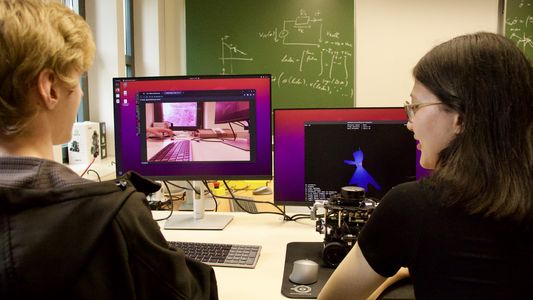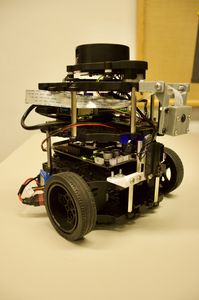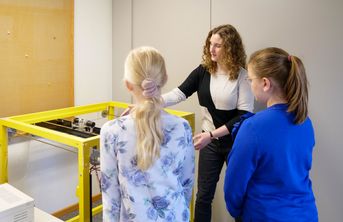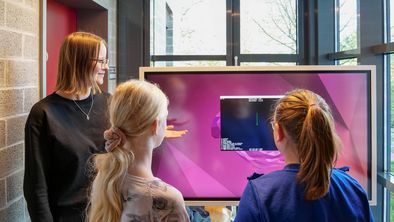Aktuelles
Kontakt
Prof. Dr.-Ing. habil. Andreas Rauh
Department für Informatik (» Postanschrift)
Sekretariat
Aktuelles
März 2025
EU Horizon project: BATTwin - Projekttreffen in Grenoble
The BATTwin project partners have gathered in Grenoble for an insightful and intensive two-day meeting on March 27th and 28th, 2025.
Hosted by Schneider Electric, the meeting allowed an overview of the performed work in the previous months. As such the process and system-level digital twins development, the impact assessment of the proposed solution and communication and exploitation steps have been discussed. In addition, workshops have been organised on specific aspects of data modelling and the design of process-level and system-level digital twins.
Teilnahme am Battery 2030+ Roadmap Workshop in Ulm
In the frame of the Battery 2030+ Roadmap Workshop, held in Ulm, Germany, on the 19th of March 2025, Andreas Rauh presented the goals and the current status of BATTwin.
During this presentation a special attention was given to the development of process-level and system-level digital twins as well as to strategies for the quantification of uncertainty and model reliability.
Februar 2025
Horizon Europe - Meeting for the Development of Process-Level Digital Twins for Battery Manufacturing in Oldenburg
On the 3rd of February, a groHeorizon Europeup of international collaborators of the EU Horizon project BATTwin (Flexible and scalable digital-twin platform for enhanced production efficiency and yield in battery cell production lines) involving Politecnico di Milano (Italy), the Research Laboratory on Engineerinsensg & Management Intelligence, SZTAKI (Hungary), Sivas University (Turkey), Verkor (France), and Carl von Ossietzky Universität Oldenburg (Germany) met in person in Oldenburg to discuss recent advancements on the development of process-level digital twins for battery cell production. The key aspects of the meeting were the formalization and further development of the different submodels throughout the production chain from raw material mixing to formation and aging. Especially, the formalization of the modeling procedure will be an essential building block to allow for an interconnection of the models for different stages of the cell production in a unified framework which should not only address nominal operation of the manufacturing process but also detect reasons for scrap, give indicators for process optimization, and quantify the quality of the developed models and their forecasts by means of uncertainty modeling and sensitivity analysis.
The group of participants identified routes for further developments within BATTwin and exchanged the outcomes in a hybrid discussion format with those consortium partners who could not be present in Oldenburg. Lastly, the workshop identified possible further collaborations within the project that aim at the development of system-level digital twins as well as the design and optimization of feedforward and feedback control approaches.
November 2024
Auszeichnung des Promotionsvorhabens von Marit Lahme durch die Stiftung Energie & Klimaschutz
Im Rahmen des von der Stiftung Energie & Klimaschutz als Ideen-Wettbewerb für Nachwuchswissenschaftler*innen ausgerichteten Energie-Campus wurde das derzeit laufende Promotionsvorhaben von Frau M.Sc. Marit Lahme mit dem 3. Platz ausgezeichnet.
Im Rahmen ihrer Forschung befasst sich Frau Lahme mit der Intervallbasierten Identifikation der Leerlaufspannungskennlinie von Batteriezellen mit dem Ziel der Alterungserkennung. Batterien sind sowohl in modernen Systemen der Unterhaltungs- und Kommunikationselektronik, als auch im Transport- sowie Energiesektor nicht mehr wegzudenken. Im Rahmen ihrer Promotion entwickelt Frau Lahme eine neuartige Methode, die es ermöglicht, Alterungseffekte von Batteriezellen im laufenden Betrieb, ohne die Notwendigkeit von spezifizierten Eingangssignalen zu ermitteln. Diese Methode basiert auf der Online-Schätzung der Leerlaufspannungskennlinie, welche als Alternative zur elektrochemischen Impedanzspektroskopie genutzt werden kann. Die Leerlaufspannungskennlinie einer Batteriezelle beschreibt die Abhängigkeit der Leerlaufspannung vom Ladezustand. Ihre Kenntnis stellt damit die Grundlage für einen sicheren und lebensdauerverlängernden Betrieb dar. Diese Kennlinie ist eine nichtlineare Funktion und wird durch verschiedene Faktoren, zum Beispiel durch Alterungseffekte oder die Temperatur der Batteriezelle beeinflusst. Auf Basis der identifizierten Leerlaufspannungskennlinie und ggf. des Innenwiderstandes können Rückschlüsse auf die Änderungen aufgrund von äußeren Einflussfaktoren gezogen werden. Im Rahmen dieser Arbeit wird eine höchst innovative Online-Methode entwickelt, die es ermöglicht, Charakteristika wie die Leerlaufspannungskennlinie von Lithium-Ionen-Batterien während des Betriebs zu identifizieren, um das dynamische Verhalten der Batteriezelle zu approximieren. Neben der methodischen Herleitung neuartiger Schätzverfahren arbeitet Frau Lahme intensiv an der experimentellen Validierung ihrer Ergebnisse an Prüfstandsaufbauten der Abteilung Verteilte Regelung in vernetzten Systemen.
Wir gratulieren Marit herzlich zu dieser hervorragenden Wertschätzung ihrer Forschung, die bereits durch einige Konferenz- und Zeitschriftenpublikationen internationale Sichtbarkeit erlangt hat!
Nominierung von Andreas Rauh für den Preis der Universitätsgesellschaft Oldenburg für hervorragende Promotionsbetreuung
Andreas Rauh wurde für den Preis der Universitätsgesellschaft Oldenburg für hervorragende Promotionsbetreuung nominiert.
Wir freuen uns insbesondere darüber, dass in diesem Jahr 5 der 7 Nominierten Mitglieder der Fakultät für Informatik, Wirtschafts- und Rechtswissenschaften sind (Volker Boehme-Nessler, Christian Busse, Jörn Hoppmann, Andreas Rauh, Jürgen Sauer).
Ein herzlicher Glückwunsch geht an unseren Kollegen Jörn Hoppmann (Leiter des Lehrstuhls für Management) als diesjährigem Preisträger.
EU Horizon project: BATTwin - Projekttreffen in Budapest
The BATTwin consortium gathered in Budapest on the 7th and 8th of November for an insightful two-day meeting hosted by HUN-REN SZTAKI. During the meeting, the impactful work done over the past five months was reviewed, and the next steps were discussed.
The event featured hands-on workshops and visits to SZTAKI’s cutting-edge labs, diving deeper into the tech shaping the future of digital twins.
August 2024
Antrittsvorlesung von Andreas Rauh
Juni 2024
Promotion von Friederike Bruns zum Dr.-Ing.
Am 18.06.2024 hat Friederike Bruns ihre Dissertation „Systematic Correct-by-Construction Design for Industrial Real-Time Communication” am Department für Informatik der Carl von Ossietzky Universität Oldenburg erfolgreich verteidigt. Wir gratulieren Friederike herzlich zu dieser hervorragenden Leistung!
Mai 2024
EU Horizon project: BATTwin - Projekttreffen in Paris
The BATTwin Project held a two-day meeting on the 30-31 May 2024, in Paris, France. The M6 meeting was co-organised by HESAM Université, ENSAM and CNAM. Project partners discuss the progress of their work in the project and plans for their future work.
On the second day of the meeting, the partners had the opportunity to visit CNAM labs and experience the Digital Twin in virtual reality for learning. They also had the chance to visit the well-known industrial design museum: Musée des Arts et Métiers
April 2024
Creation of the Scientific Committee of the Upcell Alliance
During the meeting of the European Battery Manufacturing Appliance Upcell, held at Politecnico di Milano from April 11-12, 2024, its scientific committee was created.
The members of this committee are (in alphabetic order):
- Prof. Corsin Battaglia (Head of Laboratory Materials for Energy Conversion, Empa - Swiss Federal Laboratories for Materials Science and Technology)
- Prof. Marcello Colledani (Technology and Production Systems Lab, Department of Mechanical Engineering, Politecnico di Milano, Italy)
- Prof. Tarek Raissi (Cédric Laboratory, Conservatoire national des arts et métiers – Cnam, Paris, France)
- Prof. Andreas Rauh (Carl von Ossietzky Universität Oldenburg and OFFIS e.V., Oldenburg, Germany)
Februar 2024
Januar 2024
EU Horizon project: BATTwin - Flexible and scalable digital-twin platform for enhanced production efficiency and yield in battery cell production lines
From January 17th to January 19th, 2024, the BATTwin consortium celebrated the Kick-off Meeting at the Department of Mechanical Engineering of Politecnico di Milano, in Italy.
The consortium had the opportunity to touch upon the objectives of the project, discuss the future steps, plan the work for the next phase of the project and visit the laboratories of the Department of Mechanical Engineering.
Coordinated by Prof. Marcello Colledani within Politecnico di Milano, and involving sixteen partners, BATTwin - Flexible and scalable digital-twin platform for enhanced production efficiency and yield in battery cell production lines, started on December 1st, 2023. The project, awarded with €6.9 million, aims to support the ramp-up phase of the European battery gigafactories by developing a Multi-level Digital Twin platform for Zero-Defect Manufacturing in battery production that will reduce defect rates in battery production lines. The solution integrates (i) a multi-sensor data acquisition and management layer, supported by data semantics through a Digital Battery Passport data model, (ii) process-level digital twins, modeling the critical stages of electrode manufacturing, cell assembly and conditioning, (iii) system-level digital twins and (iv) user-centric, goal-driven digital twin workflows. This approach will be tested in two industrial pilots producing different battery chemistries and geometries, validating the flexibility and scalability of the approach towards Zero Defect European Gigafactories.
The research unit „Distributed Control in Interconnected Systems” of the Carl von Ossietzky Universität Oldenburg is thrilled to be part of this project as partner on the development of digital twins for battery production stages with a focus on their use in monitoring, state stimation, and control.


